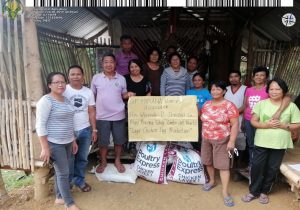BACKGROUND
For the longest time, the municipality of Salug has experienced an insufficient supply of fresh eggs. Most of the suppliers come as far as Cebu and Cagayan de Oro City. It was no wonder why most often, the consumers in the locality were buying not fresh and sometimes spoiled eggs. Bakeries also were not able to bake quality cakes, pastries and bread due to the lack of farm fresh eggs. The students and working people found it difficult to cook fresh eggs for their breakfast as well.
This situation prompted the local government unit of Salug to dream of becoming the “egg basket” for the province of Zamboanga del Norte. Salug is located almost at the center of the province.
In 2017, the breakthrough came when the Department of Agriculture (DA) started the implementation of the Special Area for Agricultural Development (SAAD) Program for the top ten poorest provinces in the country. Zamboanga del Norte is one of these provinces.

The Office of the Municipal Agriculturist recommended two (2) associations, which are the Pacuhan-Pucay and the Liguac Farmers’ Associations, to be the initial farmer-partners for SAAD Program. Their proposals are the establishment of the Egg Layer Chicken Raising Project using the “egg machines” type of the modular poultry raising. Each “egg machine” consisted of 48 laying pullets, feeder, and drinker installed with galvanized cage. The DA-SAAD granted 36 modules for the two (2) farmers’ associations.
Encouraged by the successful implementation of the project, the LGU Salug expanded the layer chicken projects to an additional two (2) associations in Barangay Bacong and Barangay Ramon Magsaysay with 38 modules of “egg machines”.
Both, the Christian-Muslim-Subanen Organization in Barangay Ramon Magsaysay and Bacong Farmers and Fishermen Association (FFA) were each given 19 modules of “egg machines”.
For all the farmer-partner associations, the DA-SAAD provided egg machines, an initial supply of feeds good for two months, one unit of a wheelbarrow, and plastic egg trays.
Aside from the material inputs, all the associations underwent various social preparation and technical training. The training activities include Organizational Management, Project Management, Financial Management, and Policy Formulation. These all aimed at strengthening the capacity of the farmer-partners for community-managed projects.
INNOVATIONS/GOOD PRACTICES
“Bayanihan” spirit is alive in the villages where the egg layer projects are implemented. In Bacong, all the members tend to their poultry project on a rotational basis. They hired a permanent caretaker but a team of two or three members of the association renders daily duty to assist in cleaning the poultry area, feeding the layer chicken, and harvesting eggs. This practice paid off resulting in good poultry farm management as well as maintenance of cleanliness and hygiene in the surrounding. As a result, the members took pride in their project and had strong ownership of the livelihood endeavor. They are not just recipients or beneficiaries. They are real owners.
The presence of the member-volunteers has multiple impacts on the project. The association has instituted timely and correct farm production records and sound bookkeeping practices. Also, pilferage as well as entry of predators like dogs, wild cats and snakes are prevented.
The association strictly observes regular meetings. All production output and sales are reported during the meeting. Cash sales are deposited regularly by the treasurer, who also acts as the purchaser of feeds and other requirements of the poultry operation.
The association has already established a regular market outlet for the eggs produced on the farm. They already penetrated the market in the adjacent municipalities of Postigo and Liloy. Locally, the association sells its products in the Poblacion with bakeries and “sari-sari” stores as among the major buyers.
STATUS
Bacong FFA is now on its 7th month of operation with 904 heads of ready-to-lay pullets alive, producing 810-820 eggs a day. Aside from the 19 modules received, they were also
provided with 114 bags of layer feeds, 350 pieces of plastic egg trays and a wheelbarrow. At least 27 egg trays are being sold a day by the marketing in-charge.
Before the end of 2019, the association will receive an additional 10 modules of ready-to-lay pullets with cage, 64 bags of layer feeds, another unit of a wheelbarrow, and an egg weighing scale as programmed under DA-SAAD. The expansion of the poultry house has already planned out by the group. It will be constructed before the delivery of the additional stocks.
The association already has Php 220,000.00 savings in their bank account. Passbook is in the custody of their treasurer. All financial transactions of the association are being recorded and reported to the group.
FACILITATING FACTORS/CHALLENGES
The personnel from the Office of the Municipal Agriculturist, Roy R. Pagador, always extend their technical assistance to the association especially when it comes to production and health management practices, and even on the marketing strategies. The untiring effort of the DA family also contributes to the realization of the project.
Unity is also the key; without it comes imminent failure. Teamwork, in an operational/enterprise project like this, serves as a propeller leading to greater success. It also increases collaborated innovations. The Bacong FFA is making sure all of these are being practiced.
IMPACT
Due to a great demand for eggs for consumption, layer poultry farming becomes more profitable. Poultry farming contributes significantly to poverty alleviation and the improvement of food security. The project provides a source of high-quality protein and fresh eggs in the locality.
By 2020, Bacong Farmers and Fishermen Association and the three (3) other associations of the municipality will operate a maximum of 30 modules of layer chicken each. This will increase employment to jobless farmers and empower communities.
Poultry can also be used as a poverty mitigation tool for it develops other alternative livelihoods as well as utilizes local resources and local market chain.
POLICY/PROGRAMME/COOPERATION/IMPLICATION
The sustainability of community-managed projects like the ones in Salug is dependent on the support they will receive from concerned government agencies.
The DA-SAAD may have initiated the project but for the industry to flourish and succeed, it needs support from larger financial institutions. The Agricultural Credit and Policy Council or the Agricultural Competitiveness Enhancement Fund (ACEF) Lending Program may look into the financial requirement of the project to expand its operation. The Department of Trade and Industry may consider their assistance in setting up the market linkage. The Agricultural Training Institute of the DA may contribute to the capacity-building aspect by including technical skills upgrading training in egg production.
Ultimately, the project may need to consider establishing its own feed mill to supply the feed requirement of the poultry business.
Further, the DA should sustain its groundwork in building strong basic agriculture communities as key players in the fight against poverty.
Written by Rachel Rubio

